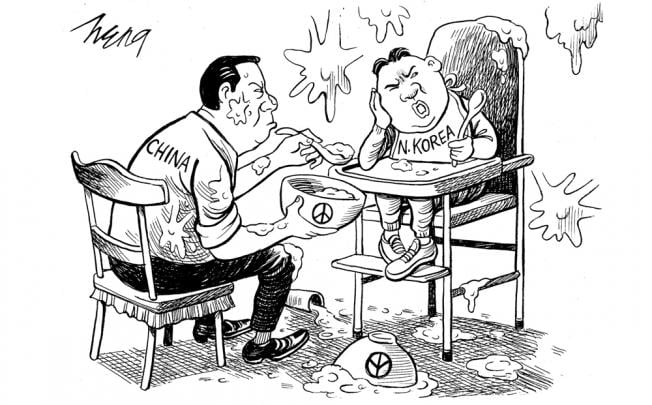
It is increasingly obvious that China can no longer be patient over the North Korean issue. (South China Morning Post)
It is always surreal to watch the televised images of the heir of the Kim family dynasty, Kim Jong-un, strutting around his senior subjects with a cigarette between the fingers.
What is even more surreal is the oddity of the heir’s relentlessly pursued agenda—‘Byungjin Line’ (meaning ‘Guns and Butter’ but more like ‘Guns over Butter’ in actual implementation). At the 7th Party Congress held last May, one of Dennis Rodman’s best friends obstinately manifested that he will unflinchingly invest in the completion of his ballistic missiles and nuclear weapons portfolio, whatever the cost is to its people. Kim’s such dogged ‘Songun’ (Military-first) position clearly demonstrates that he will not follow the Chinese path of moving towards economic reform with a degree of openness.
Kim Jong-un’s diplomatic craftsmanship is disastrous. Since he came into power in 2011 he has not yet made a single official visit to China. Meanwhile China, the G2-aspiring major power, has unwittingly earned an international obloquy as the Kim regime’s one and only godfather; largely because the major power accounts for more than 70% of the regime’s foreign trade, and most of its food and energy supplies.
Instead of reviving its regime’s effete comradeship with China, in 2013 Kim executed his own uncle, Jang Sung-taek. Jang was then the second most powerful person in the Kim regime and China’s most trusted power broker, who dominated the development of trade cooperation and border economy (‘Shinuiju’ meaning special administrative district) with China.
In an official response to Jang’s execution, China hoped to ‘continue’ maintaining a ‘healthy’ relationship with the Kim regime, but the consequences of spoiling little Kim are harmful. Internally, Kim’s support base has been engulfed by his father’s hawkish loyalists who compete for the boss’ trust, notwithstanding the fact that the boss is too survival-conscious (or hyper-rationally ‘mad’) to have faith in anyone but his ballistic missiles and nuclear weapons portfolio.
Externally, the Kim regime keeps flaunting its nuclear missile capabilities in defiance of the international community’s sanctions. The latest UN resolution 2270 was signed in March 2016 to call upon member-states to ban their support for the Kim regime’s WMD (Weapon of Mass Destruction) related activities, like transportation of WMDs, and to embargo coal and other mineral exports from the regime.
Scoffing at the fifth UN Security Council (UNSC) sanction that it received, on August 24th the regime lofted at a high angle a long range KN-11 Submarine-launched Ballistic Missile (using ‘cold-launch’ technology). This landed in the water of Japan’s Exclusive Economic Zone (EEZ). And on September 9th (North Korea’s National Foundation Holiday), the regime further conducted its fifth and biggest underground nuclear warhead test yet (the alleged impacts round up to 10kt), dismissive of the G20 summit hosted in China.
The credibility of Kim’s threats has become existential to the extent that, if the regime really possessed miniaturized nuclear warheads as it claims, its long-range Intercontinental Ballistic Missile (ICBM) and SLBM could nuke the west coast of the U.S. mainland. Such existential threats gives the U.S.-led trilateral alliance in Northeast Asia legitimate reasons to resort to preemptive strikes, in case the Kim regime shows any signs of a nuclear attack.
Unlike his father, Kim Jong-il, who at least kept the de-nuclearization card under the negotiation table of the six party talk, Kim Jong-un is not as dexterous in finding the fulcrum point on the dovish-to-hawkish scale. The danger with little Kim is that his threats swing back and forth in a pendulum between the two polarities of “artilleries and nuclear weapons”.
China must understand that Kim Jong-un’s behavioral incorrigibility concurs with the collapsibility of the regime, not because of exogenous pressures, but from internal malfunctions. The dilemma for the Kim regime is that maintaining political stability through reinforcing a frayed Juche ideology is always more important than promoting a degree of openness in the informal Jangmadang economy.
Thus, the regime will be more repressive in putting an end to the North Korean people’s increasing market demands and simultaneously over obsession with its ballistic missiles and nuclear weapons portfolio. For the foreseeable future this can only be exacerbated, especially when the North Koreans (those who surreptitiously access outside information) confirm the own economic reality―namely of being relatively deprived, at a 1:40 per capita income gap, in comparison to their kindred South Korean people,.
It is expected that the United States might soon apply the Iran Model to the Kim regime, in order to strengthen sanctions against the regime’s incorrigible behavior. Pundits warn that China will be offended by the United States’ initiation of a secondary boycott on Chinese companies transacting with North Korea, foreboding possible ruptures in cooperation between the United States and China on the Korean peninsula.
Despite the gloomy picture, whenever Kim Jong-un poses another new non-negotiable threat, it becomes ever more obvious that China can no longer be patient over its buffer zone; it is turning into a rambunctious nightmare to regional security. A number of Chinese experts have recently recognized that Kim Jong-un is a worn-out nuisance. Perhaps now is the ripe time for China to recalibrate it policies towards North Korea.